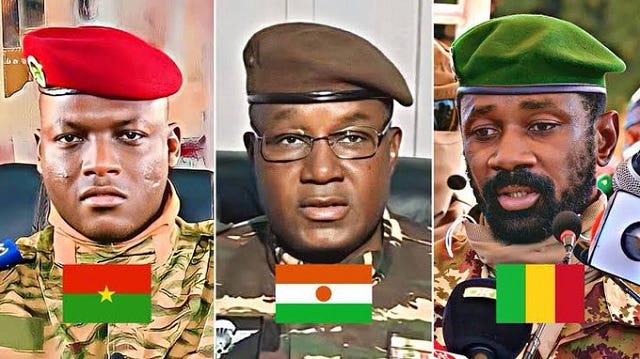West African Nations Grapple with the Aftermath of the Niger Coup
ECOWAS Withdrawals, New Alliances, and the Push for Inclusive Leadership in the Sahel.
Ibrahim-TraoreGeneral-Tchiani-and-Assimi-Goïta (Photo: @Africa_Achives)
In a dramatic turn of events that has captured global headlines, Niger, alongside fellow junta-led nations Mali and Burkina Faso, has officially withdrawn from the Economic Community of West African States (ECOWAS). This unprecedented move, confirmed by ECOWAS President Omar Alieu Touray in Abuja, effectively ends more than a year of tense negotiations aimed at keeping the regional bloc united.
The Nigerien Context and Wider Regional Tensions
The latest crisis erupted after Niger’s military ousted the democratically elected government in July 2023. While echoes of similar coups in Mali and Burkina Faso reverberated across international media—covered by outlets such as the BBC and CNN—the Nigerien coup stands out for its broader impact on security and governance structures. ECOWAS, traditionally seen as a champion of democracy and economic integration, demanded a swift return to constitutional rule. However, Niger’s junta rejected these demands, aligning instead with Mali and Burkina Faso in forming the Alliance of Sahel States and forging new security partnerships, notably with Russia.
This withdrawal poses challenges for the region on multiple fronts:
Governance Crisis: The turmoil threatens critical governance mechanisms and the provision of essential services, potentially reversing gains in healthcare, education, and infrastructure that were supported through ECOWAS frameworks and international partnerships.
Regional Security Concerns: Observers worry that extremist groups could exploit political instabilities, further destabilizing border regions and leading to forced displacement. Neighboring states—already grappling with high unemployment and fragile political systems—fear a spillover effect of violence, making collective security efforts more difficult.
Economic Uncertainty: ECOWAS was initially established in 1975 to deepen economic cooperation, including free movement of people and goods. The departure of three member states complicates cross-border trade. Coupled with suspensions of Western aid to the Sahel, economic vulnerabilities risk deepening poverty levels across the subregion.
ECOWAS’ waning credibility
Analysts note that the exit of these three Sahelian states reveals a growing sentiment among citizens in West Africa: that ECOWAS has failed to address local grievances and strengthen democratic governance. Ulf Laessing, head of the Sahel program at the Konrad Adenauer Foundation, commented that the withdrawal underscores a “legitimacy crisis” for the regional bloc. With Mali, Burkina Faso, and Niger among the poorest in the region, their departure raises questions about ECOWAS’ inclusivity and responsiveness to the needs of ordinary citizens.
Despite this setback, Touray reiterated that ECOWAS’ “doors remain open,” instructing member nations to maintain cooperation with Niger, Mali, and Burkina Faso where possible. Meanwhile, the bloc is caught between sanctions and diplomacy; it must decide whether to continue pressuring these governments or to engage them to avert humanitarian crises.
Local and International Reactions
In Niamey, the junta has seized on anti-French sentiment and broader frustrations with external influences to consolidate power. Local media, including Nigerien newspapers like Le Sahel, report that a shift toward non-traditional alliances has been met with mixed reactions from Niger’s urban youth, who are looking for quick solutions to insecurity and unemployment.
Internationally, major outlets such as CNN and the BBC highlight that France and the United States have withdrawn some counter-terrorism support, citing the unconstitutional nature of the junta. Russia’s growing footprint—offering training and hardware—reflects a shifting security dynamic that could reverberate across Africa.
Policy Recommendations
Despite the gravity of the crisis, there remain avenues for constructive dialogue and inclusive leadership. At The Inclusive Policy Digest, we propose:
Strengthening Democratic Institutions
Transparent Transition Plans: Regional bodies and global partners should pressure the juntas for a clear roadmap to civilian governance. This includes setting realistic election timelines and creating participatory forums where civil society, including women and youth groups, can weigh in on governance structures.
Dialogue-Driven Conflict Resolution: ECOWAS and the African Union (AU) must prioritize sustained dialogue over purely punitive measures. International partners—particularly within the United Nations—could facilitate mediated talks that respect local socio-political dynamics.
Inclusive Governance
Power-Sharing Initiatives: Technical assistance from respected regional think tanks and civil society networks (e.g., the West African Civil Society Forum) can support inclusive decision-making. Women and youth voices, often marginalized, should be integral to designing new governance frameworks.
Local Peace Committees: Grassroots leaders, from religious figures to community elders, can spearhead efforts to rebuild social trust. These initiatives should receive sustained funding and be coordinated with ECOWAS monitoring systems.
Leveraging Technology for Development
Digital Platforms for Transparency: Introduce open-data portals where budget allocations, security spending, and electoral processes are tracked and openly reported. This can enhance accountability and foster civic engagement.
Connectivity Projects: Partner with African-led tech hubs to expand digital literacy programs and broadband access. Better connectivity can help rural communities—those most affected by extremist violence—access services and voice local needs.
Regional Collaboration on Security
Shared Intelligence Mechanisms: Even as formal ties with ECOWAS are severed, the three Sahelian states must still cooperate on intelligence sharing to address the rising threat of extremist groups.
Border Management Innovations: Pilot new technologies like drone surveillance and electronic border checkpoints to reduce smuggling and illegal armed group movements.
Amid these uncertainties, West Africa retains a vibrant civil society and a young population eager to shape its future. ECOWAS, albeit bruised, remains an essential institution if it can reinvent itself to champion not only the interests of political elites but also the aspirations of everyday citizens. Local and international stakeholders all have a role to play, ensuring that this crisis becomes a turning point for greater inclusion, better governance, and sustainable development.
#Sahel #InclusivePolicy #Africa #Governance #Policy #Leadership #NigerCrisis #ECOWASWithdrawal
At The Inclusive Policy Digest, we believe that with principled leadership, rigorous democratic processes, and inclusive policies—fueled by innovative technology—a more stable, equitable West Africa is within reach. Subscribe to stay informed on developments shaping Africa’s governance landscape, and join our community dedicated to championing social justice and inclusive policy solutions.





